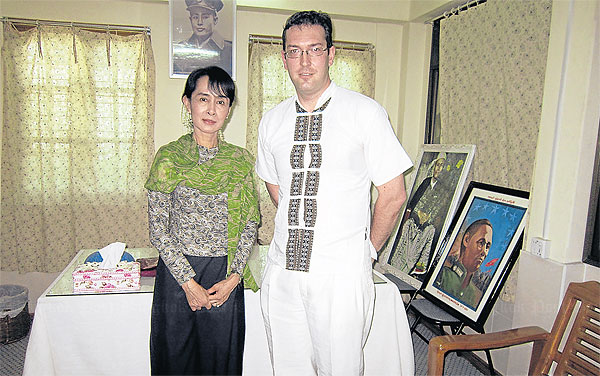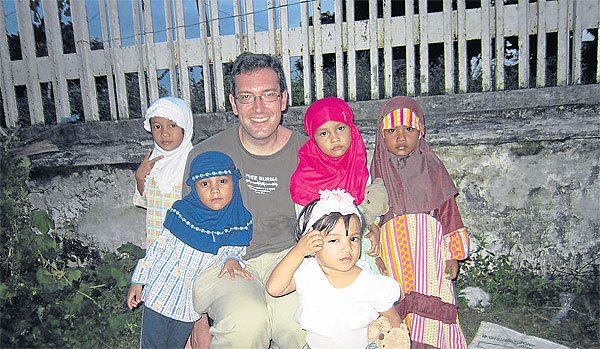Love affair with Myanmar
Britain’s Benedict Rogers wears many hats —politician, human rights activist, author and journalist — but his love for Myanmar cuts through all the facets of his work and life.
Myanmar’s internal conflict has been in news since the country’s military began showcasing reforms to woo Western business interests about two years ago. But Benedict Rogers fell in love with the country’s people when the rest of the world had little idea about who the Karen, Kachin and Rohingya people are.
“[Aung San Suu Kyi] has made a transition from a moral icon to a politician, which is a different role. People who say they are disappointed in her see her in the category of Mahatma Gandhi, Martin Luther King and Desmond Tutu, who never sought electoral office. But we should see her in the category of Nelson Mandela or Chinana Gosnell”
“I’ve been involved in North Korea and Indonesia; I have earlier been involved in East Timor, Pakistan, the Maldives and China. But I feel most strongly about Burma,” said Rogers, using the country’s colonial name.
As deputy chairman of Britain’s Conservative Party Human Rights Commission, he advises Prime Minister David Cameron and Foreign Secretary William Hague on international human rights issues. He is also the author of Than Shwe: Unmasking Burma’s Tyrant, the only biography available of one of the world’s most mysterious military dictators until recently. His latest book, Burma: A Nation at the Crossroads, recounts the courage and determination of the country’s people, explaining its conflicted history, as well as its contemporary struggle for justice.
Rogers, a former parliamentary candidate, got hooked on Myanmar and its people during his first visit to the Thailand-Myanmar border in the early 2000.
“What really struck me in that visit was the beauty of the country and its people juxtaposed with the brutality of what Burma was going through for decades,” Rogers, who has now travelled almost 40 times to Myanmar and all of its borders, told Asia Focus in an interview in Laguna Niguel, California, where he was attending a conference.
Rogers, who holds a master’s degree in China Studies from the School of Oriental and African Studies (SOAS) in London, was referring to the ongoing civil war in Karen and other border states of Myanmar, where Buddhists from the Burman ethnic group are in the majority. The non-Burman ethnic groups of Karen, Karenni, Kachin, Chin, Mon and Shan do not see their land as part of Myanmar, and are fighting for more autonomy.
“I was struck by how serious the injustice was but also how unknown it was to the rest of the world, which knew vaguely about Aung San Suu Kyi but paid no attention to the ethnic issue there,” said Rogers, East Asia Team Leader at London-based Christian Solidarity Worldwide. “I got involved with Burma through the non-Burman ethnic groups issue, but I have always been a strong advocate for the democracy movement as well.”
Rogers has met Aung San Suu Kyi three times, but only after a few unsuccessful attempts. In 2011, he was deported just hours before he was scheduled to meet the National League for Democracy leader in Yangon. Authorities told him he was being sent back to his home country because he had written a book on Than Shwe. This was his second and perhaps the last deportation.
“Those experiences are in the past, and the fact that I have been able to return to Myanmar several times since then, and have had no difficulties getting a visa, is a positive sign illustrating the way Burma is opening up and changing, which I welcome,” he said, adding that even before the reforms there were certain things one could do.
“I could meet with civil society groups and activists. Of course, they were taking a huge risk by meeting me, and we had to be careful about how we did it.”
Rogers recalled that his meetings with the Nobel Laureate were “inspiring”. “For years I’d campaigned for her and her release from house arrest, always hoping but never realistically believing that I’d meet her in person that seemed a distant dream a few years ago.”
Rogers is cautiously hopeful about the future of democracy in Myanmar. The reforms are mostly about a change of atmosphere, not yet a change of system, he said, referring to the guarantee of 25% of seats for the military in parliament, the immunity of the military from prosecution, the question of federalism for ethnic groups and repressive laws that are still in place. “And they have a long way to go to change the system and addressing deep human rights issues.”
When dictators unclench their fist, they should be met with an open palm, Rogers said, of the international response to reforms in Myanmar. “I do think it’s important to acknowledge and encourage changes. But they do need to go much further and the international pressure should remain.”
However, he is worried about the ongoing anti-Muslim violence, which “has the potential to derail the progress the country has made in the last two years”. The government needs to take a very clear and specific action to stop it, he said.
Asked about the criticism that Suu Kyi has not spoken strongly enough against the persecution of the Muslim Rohingya, Rogers said she was “walking a tightrope”.
“She’s made a transition from a moral icon to a politician, which is a different role. People who say they are disappointed in her see her in the category of Mahatma Gandhi, Martin Luther King and Desmond Tutu, who never sought electoral office. But we should see her in the category of Nelson Mandela or Chinana Gosnell.”
Rogers said he developed interest in human rights after he heard a talk by Baroness Cox, a cross-bench member of the British House of Lords, at a university in London in 1994.
“She spoke about the suffering of people in Sudan and Nagorno Karabakh, and I was very struck not only by how terrible the stories were, but also by how forgotten these issues are, and by the courage and graciousness of the people she was describing, courage and grace in the midst of horror. I felt prodded throughout her talk — as if someone was poking me in the ribs — and that caused me to respond.”
It took some years for Rogers to decide to make human rights his vocation. He worked as a journalist for five years in Hong Kong. He then had a year-long stint with the Sunday Times foreign desk in London. He would use his free time to become an activist. But he eventually chose to reverse the roles.
Now, while he writes regularly for the International Herald Tribune, the Wall Street Journal, The Australian, The Guardian, the Daily Telegraph and other publications in his free time, he’s a full-time activist.
Rogers, in his 40s, remains single. “In part because of the nature of my work — it isn’t a 9-5 job, it’s a calling, a vocation, a way of life, and it does draw most of my emotional energy as well as my time,” he said.
“It also isn’t the best-paid work in the world, and supporting a family on an activist’s salary isn’t easy.”
Rogers, however, does think he may meet the woman he wants to marry soon. But that doesn’t mean his love for Myanmar won’t endure, he stressed.














